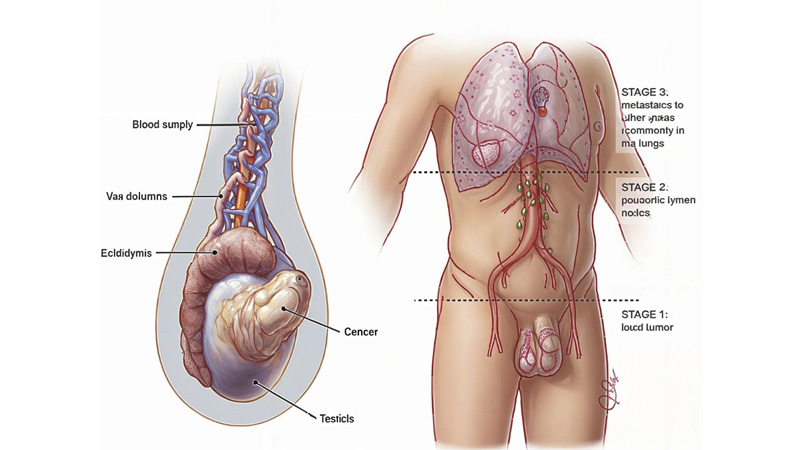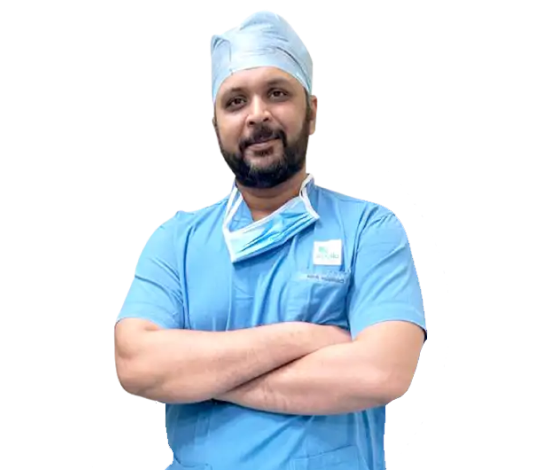Testis Cancer
TESTIS CANCER TREATMENT
Testicular cancer originates in the male reproductive organ known as the Testis. This is the organ responsible for producing sperm and testosterone hormone. Testis cancer affects most commonly in men in the age group of 15 to 35 years. It first starts growing as a small mass in the organ, and as the mass increases, the Testis size will start to increase. Early detection can help you with successful Testis Cancer Treatment and cure. Testis cancer is a highly treatable cancer, even if it spreads to other organs in the body. If you are searching for the best specialist for Testis Cancer Treatment in Ahmedabad you have landed at the right place.

SYMPTOMS AND SIGNS
It is first necessary to know its symptoms so that you don't confuse yourself with other Benign testicular diseases. The presence of one or several of the below-described symptoms in a young male may indicate the presence of Testis Cancer.
⦁ Painless lump or mass in one or both testicles
⦁ Change in testicle size
⦁ Pain or discomfort in the lower abdomen, testicles, or scrotum.
⦁ Pain in the lower back area
⦁ Heaviness or fullness in the scrotum
⦁ Unusual fatigue or draining of strength
One must understand that these symptoms of Testis Cancer can be confused with other causes. Hence, if one notices any of these signs, one should promptly consult a nearby Urologist or Uro Oncologist for screening. If your symptoms match with this type of cancer, consult at our clinic.
CAUSES AND RISK FACTORS
Most of the men who get this type of cancer do not have a definite known risk factor. However, few pre-existing conditions increase the risk of developing Testis cancer. Awareness of these risk factors that can increase testicular cancer incidence can lead to early detection. With the help of early diagnosis, those who have risk factors can successfully deal with this condition.
Young Age - It's mostly detected in men of the early and middle age. It peaks at 15-40 years old.
History of Testicular Cancer - The risk of developing testicular cancer in the other organ increases for men who have previously suffered from Testis cancer on one side.
Testicular microlithiasis - There are tiny calcium deposits in a man's testicle. It is associated with increased detection of Testis cancer.
Undescended Testis - A history of Cryptorchidism at birth predisposes to developing testicular cancer.
Family History - A history of testicular cancer in the father or brother increases the risk of developing testicular Ca.
Infertility - It has also been related to elevated occurrence of testicular Carcinogenesis.
If you have any of these risk factors, visit a Testis Cancer Specialist or Uro-Oncologist for screening and evaluation. Remember that getting a timely medical assessment can save much of your time.
DIAGNOSIS
When you visit a urologist, he might undertake a proper history and perform certain tests for diagnosing testicular cancer. Different diagnostic tests are available in the market, including imaging tests, and blood tests. Reference for each test is given below for your understanding.
Clinical Evaluation - Primarily, the diagnostics start with a detailed medical history. The physician can inquire about symptoms or signs, family history and risk factors to determine a baseline case.
Physical Examination - Physical examination is done to both testicles, scrotum, groin area and abdomen for abnormalities like lumps or swellings.
Imaging Tests - After the physical exam, your doctor might suggest certain imaging tests, usually a
Scrotal ultrasound - primarily to evaluate the content of your scrotum, i.e. both Testis
CT abdomen and Chest - This is usually advised to evaluate the spread of cancer in the retroperitoneum or lungs.
Blood Tests - Blood work checks for specific tumor markers of testicular malignancy like alpha-fetoprotein (AFP), beta human Chorionic Gonadotropin (β-HCG) and lactate dehydrogenase LDH. Increased concentrations of these markers may indicate the presence of testicular Neoplasia and help determine the stage and prognosis.
STAGES OF TESTIS CANCER
Before the optimal Testis cancer treatment is decided, diagnosis of stage of the cancer has spread in the body is required. After all relevant investigations are done, Testis Cancer staging is done.
It is usually divided into:

Stage 0 - This stage is also called Germ cell neoplasia or stage 0. Testis cancer usually starts with the abnormalities in the Testis at a cellular level. Its cells look abnormal under the microscope. The seminiferous fluid inside the cells looks abnormal under the microscope if Testis cancer has spread in the Testis.
Stage I - The cancer is limited to the testicle and has not spread to lymph nodes or other parts of the body. It's better to start the treatment at its beginning stage for better results.
Stage II - The cancer has spread to lymph nodes in the abdomen or pelvis but has not spread to other parts of the body.
Stage III - The cancer has spread beyond the lymph nodes to other parts of the body or other organs like the lungs or liver.
Staging helps determine the best Treatment and cure for Testis cancer. If you have been diagnosed with this cancer and looking for Testis Cancer Surgery in Ahmedabad, consult us.
TREATMENT
To get the best results for Conventional or Robotic Testis Cancer Treatment, a multi-disciplinary team of Uro-Oncologist. Medical and Radiation Oncologist is required. It usually requires multi-modality therapy consisting of surgery (High Inguinal Orchiectomy, RPLND), along with radiation therapy and chemotherapy.

The treatment usually begins with the following -
High Inguinal Orchiectomy - This is the surgical removal of an afflicted Testis. Depending on cancer pathology (Seminoma or Non-Seminoma) and staging CT scan and serum markers, a Uro-Oncologist might advise further Treatment in RPLND or Chemotherapy.
Chemotherapy - Chemotherapy is usually indicated for advanced stages of cancer like clinical stage (CS) 2 and 3 Non-Seminoma Germ Cell Tumor (NSGCT) as well as Seminoma Germ Cell Tumor (SGCT). It may also be advised in select cases of Stage 1 GCT.
Radiotherapy - Targeted radiation to retroperitoneum is used mainly for CS 1 seminoma tumors or in adjuvant therapy after RPLND surgery.
Retroperitoneal Lymph Node Dissection (RPLND) - RPLND is recommended for CS1 NSGCT and the removal of residual tumours after chemotherapy in NSGCT and Seminoma GCT. It consists of the removal of lymph nodes in the retroperitoneum and abdomen. It can be done via traditional Open Surgery or Robotically.
Robotic Retroperitoneal Lymph Node Dissection (Robotic RPLND) - Robotic Retroperitoneal Lymph Node Dissection (R-RPLND) is a surgical procedure to remove affected lymph nodes in testicular cancer. This advanced Robotic-assisted technology is used to carefully remove the disease while preserving the surrounding nerves responsible for ejaculation. At Our center, majority of RPLND surgeries are done robotically, led by Senior Robotic Uro-Oncologist for Testis Cancer Treatment in Ahmedabad- Dr. Rohan Patel.
Open RPLND - Open Retroperitoneal Lymph Node Dissection (RPLND) is a traditional surgical procedure where a large incision of about 20 -25 cm is made during lymphadenectomy. It is still used in cases of complex diseases.
These treatments regimen seek to eliminate the chances of relapse and optimize therapeutic efficacy according to patient requirements and disease nuances. Frequent surveillance and testing from Testis Cancer Specialist are necessary even after the treatment to evaluate growth and identify any probable recurrence of cancer.
At our center, Dr. Rohan Patel is a medical professional renowned for his expertise in Robotic Surgery in Testis Cancer in Ahmedabad. His commitment to patient care makes him one of Gujarat and India's most sought-after Uro oncologists. He encourages young males experiencing symptoms or suspecting Testis Cancer to consult with him promptly. With his skill and dedication, he ensures that patients receive the best possible care and outcomes in their battle against this disease.
To Consult with The Best Uro-Oncologist or the Best Hospital for Testis Cancer Treatment in Ahmedabad, India: Call Now
Advanced Urology
Better Living

Why Choose Dr. Rohan Patel as Your Testis Cancer Specialist in Ahmedabad?
At Ananta Urology and Robotics Clinic, we provide personalized care for each patient. You will receive the attention and expertise you deserve. We use advanced robotic surgery techniques that help you recover faster and achieve better results.

0+
Years of Expertise

0+
Satisfied Patients

0+
Successful Robotic Surgeries

Comprehensive Cancer Team

Top-Rated Urooncologist

Fellowship from Vattikuti Foundation (USA)
FAQS
- pain in the back,
- pain in scrotum or testis
- Sudden unexplained loss of weight of more than 10 kgs in 3 months
- Swelling in Testis
- Heaviness in Scrotum



